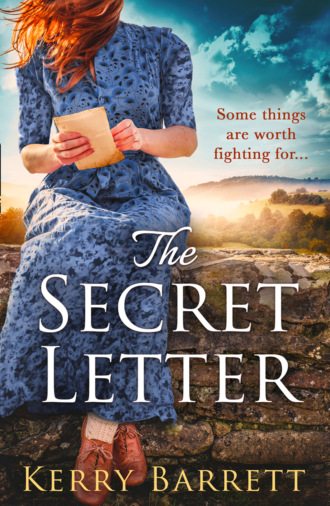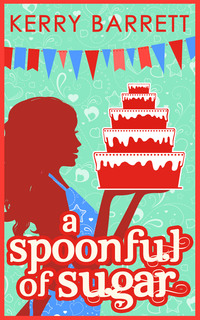
Полная версия
The Secret Letter

About the Author
KERRY BARRETT is the author of eight novels, including the Strictly Come Dancing themed A Step in Time, and The Girl in the Picture, about a crime novelist who solves a 160-year-old mystery.
Born in Edinburgh, Kerry moved to London as a child, where she now lives with her husband and two sons. A massive bookworm growing up, she used to save up her pocket money for weeks to buy the latest Sweet Valley High book, then read the whole story on the bus home and have to wait two months for the next one. Eventually she realised it would be easier to write her own stories …
Kerry’s years as a television journalist, reporting on EastEnders and Corrie, have inspired her novels where popular culture collides with a historical mystery. But there is no truth in the rumours that she only wrote a novel based on Strictly Come Dancing so she would be invited on to It Takes Two.
When she’s not practising her foxtrot (because you never know …), Kerry is watching Netflix, reading Jilly Cooper, and researching her latest historical story.
Readers Love Kerry Barrett
‘All Kerry Barrett's books are brilliant.’
‘I love Kerry Barrett’s books and this one is no disappointment’
‘Highly recommended’
‘I just loved the way Kerry took us effortlessly from one era to another’
‘Immediately bought another Kerry Barrett book – great writer!’
‘Brilliantly written gripping loved it’
Also by Kerry Barrett
The Could It Be Magic? Series
Bewitched, Bothered and Bewildered
I Put a Spell on You
Baby, It’s Cold Outside
I’ll Be There for You
A Spoonful of Sugar: A Novella
A Step in Time
The Forgotten Girl
The Girl in the Picture
The Hidden Women
The Secret Letter
KERRY BARRETT

HQ
An imprint of HarperCollinsPublishers Ltd.
1 London Bridge Street
London SE1 9GF
First published in Great Britain by HQ in 2020
Copyright © Kerry Barrett 2020
Kerry Barrett asserts the moral right to be identified as the author of this work.
A catalogue record for this book is available from the British Library.
This novel is entirely a work of fiction. The names, characters and incidents portrayed in it are the work of the author’s imagination. Any resemblance to actual persons, living or dead, events or localities is entirely coincidental.
All rights reserved under International and Pan-American Copyright Conventions. By payment of the required fees, you have been granted the non-exclusive, non-transferable right to access and read the text of this e-book on-screen. No part of this text may be reproduced, transmitted, downloaded, decompiled, reverse engineered, or stored in or introduced into any information storage and retrieval system, in any form or by any means, whether electronic or mechanical, now known or hereinafter invented, without the express written permission of HarperCollins.
E-book Edition © February 2020 ISBN: 9780008321604
Version: 2019-11-14
Table of Contents
Cover
About the Author
Readers Love Kerry Barrett
Also by Kerry Barrett
Title Page
Copyright
Dedication
Prologue
Chapter 1: Lizzie
Chapter 2: Lizzie
Chapter 3: Lizzie
Chapter 4: Lizzie
Chapter 5: Esther
Chapter 6: Esther
Chapter 7: Lizzie
Chapter 8: Lizzie
Chapter 9: Esther
Chapter 10: Esther
Chapter 11: Lizzie
Chapter 12: Lizzie
Chapter 13: Esther
Chapter 14: Esther
Chapter 15: Lizzie
Chapter 16: Lizzie
Chapter 17: Lizzie
Chapter 18: Esther
Chapter 19: Esther
Chapter 20: Lizzie
Chapter 21: Lizzie
Chapter 22: Esther
Chapter 23: Esther
Chapter 24: Esther
Chapter 25: Lizzie
Chapter 26: Lizzie
Chapter 27: Lizzie
Chapter 28: Lizzie
Chapter 29: Lizzie
Chapter 30: Lizzie
Chapter 31: Esther
Chapter 32: Esther
Chapter 33: Esther
Chapter 34: Esther
Chapter 35: Lizzie
Chapter 36: Lizzie
Chapter 37: Lizzie
Chapter 38: Lizzie
Chapter 39: Esther
Chapter 40: Esther
Chapter 41: Esther
Chapter 42: Lizzie
Chapter 43: Lizzie
Chapter 44: Esther
Chapter 45: Lizzie
Chapter 46: Lizzie
Chapter 47: Lizzie
Chapter 48: Lizzie
Epilogue: Esther
Acknowledgements
Extract
Dear Reader …
Keep Reading …
About the Publisher
To the strong women in my life who are the living embodiment of Deeds Not Words: my fabulous aunts, Pauline and Norma; my godmother, Linda; my second mum, Les; and of course, my amazing actual mum, Dorothy.
Prologue
Esther
December 1910
I picked up the letter I’d written and read it over to myself. I knew he’d never see it, but it made me feel better, just putting my feelings down on paper. Putting everything that had happened behind me.
‘Sometimes the fight is part of the fun,’ I’d written. I smiled sadly. That was exactly how I felt, and why everything had gone so wrong between us; there had just been no fight.
Picking up my pen again, I signed the letter with a flourish and then wafted the paper, waiting for the ink to dry. I wouldn’t send it. There was no need. But I wanted to keep it somewhere safe, somewhere I could find it if I ever needed to remember why I’d done what I’d done.
I glanced round my small bedroom, looking for inspiration, and my eyes fell on my fabric bag, stuffed under the bed. I pulled it out and opened it and found inside the wooden photograph frame holding the only photograph I had of my former love. Perfect. But first I had to change something else. On my bedside table was my journal and tucked inside was a photograph of myself. It had been taken at a recent suffragette rally and vain as it sounded, I loved the way it made me look. I had my chin raised slightly and a flash of fire in my eyes. I looked like a woman to be reckoned with.
Smiling, I opened the back of the picture frame and took out the photograph that was in there. Should I throw it away? No, he was part of my past no matter how horribly things had ended. Instead I put it into the bag and pushed it back under the bed. Then I put the photograph of myself into the frame, folded up the letter and put it in an envelope, carefully tucked that behind the photo and fixed the back on securely. I proudly stood the photograph on my bedside table. I would keep that picture with me, wherever I ended up, and every time I looked at it I would remember that I had been made stronger by everything that had happened.
‘The fight goes on, Esther,’ I said to myself. ‘The fight goes on.’
Chapter 1
Lizzie
August 2019
I stared at the building where I would spend most of my time for the next year, or even two, with a mixture of hope, fear and resentment.
‘Just a few months,’ I whispered to myself. ‘Just a few months, and then you can get back to normal.’
I pushed my sunglasses up on top of my head so I could see better and squinted in the brightness. It was an old-fashioned school building. The sort of building that in London would have been converted into luxury flats years ago. It had black iron railings, a paved area at the front with hopscotch markings and two entrances, over which in the stonework was carved “boys” and “girls”. I knew that at the back was a more modern extension, but staring at the front I felt like I’d gone back in time.
My stomach lurched with nerves and I took a step backwards, lowering my sunglasses again like a shield.
‘Chin up, Lizzie,’ I told myself sternly. ‘You’ve got this.’
But I wasn’t sure I did have it.
It was mid-morning but it was quiet. No one was around and I was glad. School didn’t start for another ten days though I’d come to Elm Heath early so I could move into my new house, get settled in, and generally find my feet a bit. It was very different here from my life in Clapham and I knew it was going to take some getting used to.
I took a deep, slightly shuddery breath as I thought about my ex-husband, Grant, who was – as far as I knew – still living in leafy South-West London. Predictably, he’d managed to emerge from the disaster of the last couple of years smelling of roses despite being asked to leave Broadway Common School before he was pushed. Never had the phrase “men fail up” seemed truer than when I’d discovered he’d walked into a fancy job in some think-tank, advising local councils on education policy and was earning more now than he’d ever done as a head teacher. Which was ironic considering one of the many, many things he’d done wrong was being creative with some of the school budgets.
Under my sunglasses, I felt a tear start to dribble down my nose and I reached up with one finger to wipe it away. I had to stay strong or I would fall apart. And yes, it wasn’t fair that I’d been treated with suspicion too, even though an investigation had proved that I hadn’t been involved in Grant’s misdemeanours whatsoever. But it was harder to prove I didn’t know anything about it, because while he was head of the huge junior school, I was in charge at the infants’ school next door. And as I’d soon discovered, no one really believed that I was innocent, despite what the official reports said. I’d waited for Grant to clear my name – to speak out on my behalf. But I was still waiting. Because as it turned out, Grant telling everyone I knew nothing would have effectively meant admitting he’d done all the things he was accused of. So instead he stayed quiet.
With the trust gone in our marriage, I’d found myself moving back to my mum’s house at the ripe old age of thirty-eight. And with the trust gone in my job, I’d resigned and applied for new posts all over the place – just to get away from London.
‘And here I am,’ I said out loud, still looking at Elm Heath Primary. Elm Heath was an ordinary school. It wasn’t a super, high-performing school; it was just a normal, nice-enough village primary. And that made it the perfect school for me to prove myself.
There was no doubt everything that had happened had left me needing to show the teaching world that I still had it, and I thought Elm Heath would give me that opportunity. As far as I could see, it was just a bit old-fashioned. The last head teacher had been in her job for yonks, and she’d been quite resistant to change. I thought I could drag the school into the twenty-first century, revitalise it, get my mojo back and then go back to London and to normality. Albeit a Grant-free normality.
I forced a small smile. This was just a blip, I thought to myself. Just a small hump in the road of my career. And perhaps a slightly bigger hump in the road of my personal life because despite everything he’d done, I still missed Grant. I missed being part of a team. The Mansfields. Grant and Elizabeth. A double act. A “you two”. Now it was just me.
Sighing, I picked up my bag. I’d moved into my tiny terraced house yesterday – my whole life reduced to a few boxes of books – but it was still chaotic and I had a lot to do to get sorted before term started. I really should get on with it.
As I turned to walk away from the school a voice shouted from the playground.
‘Ms Armstrong? Yoo-hoo! Ms Armstrong!’
I ignored it for a split second and then looked back over my shoulder as it dawned on me that I was Ms Armstrong. I’d applied for this job in my maiden name – part of my plan to be “me” instead of Grant’s other half.
Across the playground, a short woman – perhaps ten years older than me – came barrelling towards the gate.
‘Wait!’ she called. ‘I’ll let you in!’
I groaned as I recognised her from one of my interviews. It was Paula Paxton, the deputy head. Grant would have said she was the perfect mix of overenthusiastic and underachieving. Though she’d been very nice to me when I met her before, I just wasn’t really in the mood for company.
‘Ms Armstrong,’ she panted as she unlocked the gate. ‘I saw you from my office and thought you would want to come in rather than lurk outside. So I said to myself, I said “Paula, run downstairs and let her in – she doesn’t want to be lurking outside,” and I raced downstairs and then when I saw you pick your bag up, I thought I’d missed you.’
Faced with such jollity, I winced. Despite how nice Paula had seemed at my interview, I wasn’t sure I could deal with her kindness today when I was feeling fragile. She saw my reaction and she paused while opening the iron gate.
‘I’m babbling,’ she said. ‘I always babble when I meet new people. I’m sorry.’
I managed a weak smile. ‘Don’t be,’ I said.
She reached out and took my bag from me.
‘Coffee?’
I smiled more genuinely this time. ‘Coffee would be great.’
I followed her through the echoey corridors of the school. Generally, I disliked schools out of hours. They needed the children to make them feel alive, I always thought. But today, I appreciated the quiet stillness of the building. It was cool inside, no fancy air-conditioning could compete with hundred-year-old thick stone walls.
I was wearing a vest top, cropped jeans and Havaianas that flipped and flopped loudly down the hall. Paula Paxton was dressed for work in a neat wrap dress with court shoes and – I thought – nude tights. It was thirty degrees outside, and it was the summer holidays, so I wondered if she dressed like that all the time. On the beach. At the gym.
‘God, I’m so hot,’ she said, over her shoulder. ‘I’ve been to a funeral.’
Oops.
‘Sorry,’ I muttered, feeling horrible for having had nasty thoughts about her. Paula waved her hand at me.
‘Nah, don’t be. It was some client of my husband’s firm. I only went so I could bring the car home afterwards because I need to go to the supermarket later, and I could have got the bus, but I’ll have a lot of bags …’
I smiled and she stopped.
‘Babbling again,’ she said. ‘Here are the offices.’
She opened a door on her left. It was an original, thick with paint and with a wobbly window on the top half.
Inside was a sort of reception area with seating and two desks for the secretaries I assumed. Beyond it were two more doors, similarly old-fashioned, one marked “head teacher” and one marked “deputy head teacher”.
‘I’m on the left,’ she said. ‘I teach as well, obviously, so I don’t use my office much. But I have the coffee machine. Milk and sugar?’
After suffering in too many staffrooms where the only refreshments on offer were clumpy catering tins of instant, I was pleasantly surprised to hear there was a coffee machine. I smiled.
‘Just milk, please. I’ll just have a look at my own office if that’s okay?’
‘Hold on,’ she said. She opened the top drawer of one of the desks and pulled out a key.
‘This is yours.’
I wondered if there was any point in keeping a key just centimetres away from the door it unlocked but I didn’t say anything. Instead I simply unlocked the door.
‘I’ll fire up the Nespresso,’ Paula said. ‘Well, it’s not a real Nespresso, because they’re so expensive. It’s just the Marks and Sparks version, but I find it’s just as good …’
She trailed off, much to my relief.
‘Just come in when you’re ready.’
I nodded and, taking a deep breath, I went into my new office.
It was pretty bare. There was a big desk by the window, a round table, and two empty bookcases. On one wall there was an old-fashioned black and white photograph of a young woman wearing what I thought was Edwardian dress, and a fierce expression.
‘You’re going to have to go,’ I told her out loud. ‘I can’t have you looking down on me so disapprovingly.’
My voice bounced around the empty room.
Suddenly overwhelmed by everything, I sat down at my new desk and put my face in my hands. This was my last chance to save my career and start again but it just seemed like a huge task. Was this going to be a massive mistake?
Chapter 2
Lizzie
I sat like that for a few minutes, wallowing in my misery over my new life. None of this was my fault, I thought. I was just another one of Grant’s victims, like the parents he fooled, and the kids he let down, and whose SATs results he faked, and the PTA whose funds he siphoned off. Though that bit had never been proved, and like I said, he’d never actually admitted the rest – just insisted it was all a misunderstanding. I took a deep breath and rubbed my eyes, trying to pull myself together. I couldn’t fall apart now, not with Paula Paxton in the next room.
‘Excuse me, Ms Armstrong,’ a voice said, making me realise that Paula Paxton wasn’t in the next room; she was in my room, clutching two mugs of coffee.
I forced my head upright and tried to smile. But my neck felt weak and my smile weaker.
‘Oh dear,’ Paula Paxton said. ‘Oh dear.’
She put both mugs on the desk and in two strides was next to me. Tentatively, she touched my arm.
‘Feeling a bit overwhelmed?’ she said.
Her kind voice almost made me fall apart. With super-human strength I managed to nod, without looking at her.
‘I know what happened,’ she said. ‘In your last job, I mean. You don’t have to explain.’
Of course she knew. She’d been in my interviews; she must have read my application. Knowing she knew made me feel oddly relieved and embarrassed at the same time. I couldn’t bear her feeling sorry for me. It was the sympathy and the sad faces and the tilty heads asking ‘how ARE you?’ that had made life in London so completely awful.
Paula rubbed my arm gently and then went round the other side of the desk and sat down opposite me. She pushed one of the mugs towards me and picked up the other one.
‘I think I should tell you just how thrilled we are to have you here,’ she said in a conversational tone. ‘I’ve read all the things you’ve written in Teacher magazine. And I was actually at your training day in Brighton.’
This time I did manage to meet her eyes.
‘Really?’
Grant had been the face of our schools. We worked together but he was the driving force. He was the one doing the Tedx talks, and writing for the broadsheet education supplements about his views on education policy, and his approach to helping young children learn. He was outspoken, handsome and funny, and he really knew his stuff, so he was very media friendly. He’d even been on Question Time once. In fact, I thought it was his profile that had led him to make the bad decisions he’d made. Education is a long game and seeing children through their years at school can sometimes feel like an age. Grant couldn’t wait for results, and so he had to fiddle them, because he couldn’t be seen to be failing. Apart from in our marriage, of course. He didn’t care about that going wrong.
But I’d been passionate about what we were doing, too. I’d written a few articles for a teaching mag; I’d done a couple of seminars at training days. And it seemed Paula Paxton knew all about them.
Now she smiled at me. ‘Ms Armstrong …’
‘Lizzie,’ I said. ‘Please call me Lizzie.’
‘Lizzie, Elm Heath Primary needs a boost.’
‘I know.’
‘I’ve worked here for twenty years,’ Paula went on. ‘My daughter came here. It’s such a lovely school. We were just so thrilled when you took the position.’
I smiled at her across the top of my coffee mug. It was nice to hear after so much bad stuff.
‘You’re so inspirational,’ Paula was saying. ‘You have such wonderful ideas about putting the children first in everything.’
I felt a very small flush of pride. ‘Really?’ I said. That had always been my focus.
Paula smiled at me again. ‘I read some of your husband’s articles too.’
‘Ex-husband.’
She bit her lip. ‘He’s more about winning.’
I’d taken a mouthful of the rather good coffee while she was talking and now I swallowed it all, making me cough.
Still spluttering, I laughed for the first time in what seemed like weeks. It sounded slightly strange. ‘That’s Grant in a nutshell.’
Paula grinned at me, then taking advantage of the friendlier atmosphere between us, she leaned forward. ‘Was it awful? Your break-up?’
I shrugged. ‘You know when people say something’s ended not with a bang but with a whimper? It was like that, really. He let me down professionally and then – boom – it all just crumbled.’
‘That’s almost worse,’ Paula said and again I was surprised by her insight. I nodded, feeling another rush of self-pity and, sensing my mood, she smiled again.
‘I’ve organised a barbecue for you to meet all the staff,’ she said. ‘My house, tomorrow evening.’
‘Oh I’m not sure …’ I began. I was still finding my feet in Elm Heath and I wasn’t sure I was quite ready to meet my teachers.
Paula waved her hand. ‘It’s all arranged,’ she said. ‘I’m only round the corner from you – I’ll send someone to collect you on the way so you don’t get lost.’
I blinked at her, astonished. She’d arranged a party for me and she knew where I lived? In London I’d be suspicious of such overly friendly behaviour, but here it just seemed … nice. I thought briefly of boozy staff parties at the Three Crowns in Clapham High Street and then shook my head to clear the memories. My life was different now and I had to get used to it. And if it was totally overwhelming, then I’d stay an hour, make an excuse of doing more unpacking or something, and scarper.
‘Thank you,’ I said, smiling. ‘That’s very kind.’
‘I’ll leave you to it,’ Paula said. ‘Could I ask you to rinse out your mug and put it back in my office when you’re done?’
‘Of course.’
She got up and turned to go. ‘Feel free to make the office your own,’ she said as an afterthought. ‘If you need more bookshelves, or chairs just let Jeff the caretaker know.’
‘Thanks,’ I said again. I glanced round. It was a bigger office than the one I’d had in London and I was sure I could make it my own. My eye was caught by the portrait on the wall. ‘Paula, who’s that woman in the picture?’
She smiled. ‘That’s Esther Watkins,’ she said, proudly, as though it needed no further explanation.








